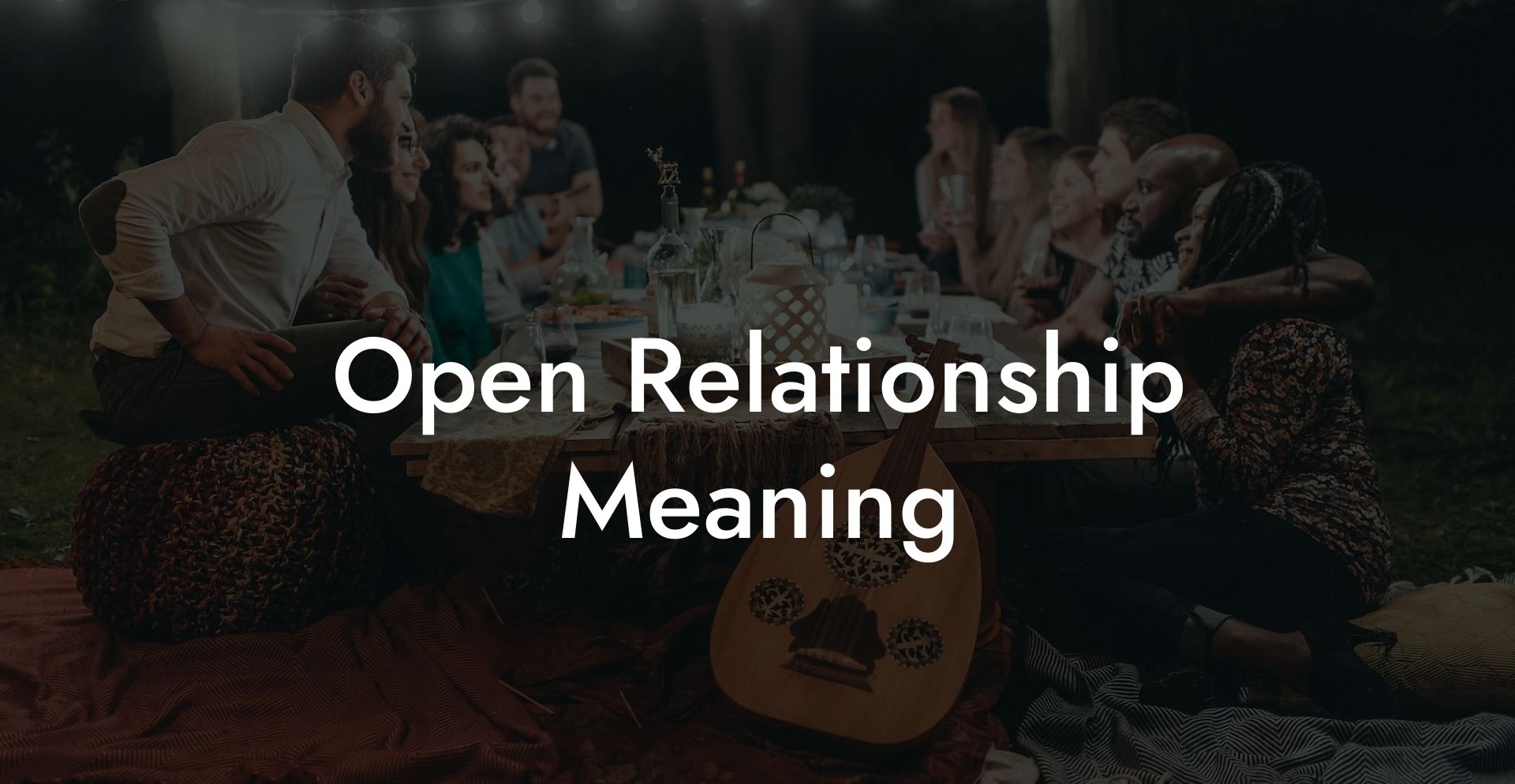Open relationships are becoming increasingly popular as people seek new ways to express love and intimacy. In today's world, traditional relationship models don't always fit everyone's needs. This concept allows couples to explore connections with others while maintaining trust and communication. It's not just about sex; it's about building a relationship structure that works for both partners. So, if you're curious about what an open relationship really means, you're in the right place!
If we're being honest, relationships are complex, and there's no one-size-fits-all approach. For some, monogamy works wonders, but for others, the idea of exploring multiple connections feels more authentic. The beauty of open relationships lies in their flexibility and the ability to tailor the dynamic to suit individual preferences. But before diving in, it's essential to understand what it truly entails and how to navigate it successfully.
Let's face it, the term "open relationship" can be a little intimidating. There are so many misconceptions out there, and people often jump to conclusions without fully grasping its meaning. In this article, we'll break it all down for you, covering everything from the basics to advanced strategies. Whether you're considering this path or just curious, we've got you covered.
Read also:Young Paradise Login Your Ultimate Guide To Accessing The Platform
What Exactly is an Open Relationship?
At its core, an open relationship is a consensual arrangement where partners agree to engage with others romantically, sexually, or both. Unlike monogamy, it allows for multiple connections while maintaining transparency and communication. It's not about cheating; it's about creating a relationship structure that aligns with your values and desires. For many, it's a way to explore different aspects of themselves while staying committed to their primary partner.
Defining the Key Principles
Here are some key principles that define open relationships:
- Consent: Both partners must agree to the arrangement, and all activities should be discussed openly.
- Communication: Honesty and transparency are crucial to maintaining trust.
- Boundaries: Each couple sets their own rules, which can vary widely depending on their preferences.
- Respect: It's important to respect each other's needs and feelings, even when exploring outside connections.
Why Do People Choose Open Relationships?
There are countless reasons why individuals opt for this type of relationship. For some, it's about exploring their sexuality without feeling confined by traditional norms. Others may want to maintain emotional intimacy with one partner while enjoying casual encounters with others. Whatever the reason, it's all about finding a setup that works for both parties.
Common Motivations
Let's dive into some of the most common motivations:
- Sexual Exploration: Many people use open relationships as a platform to explore different sexual preferences and fantasies.
- Emotional Fulfillment: Some individuals seek multiple emotional connections to fulfill different aspects of their lives.
- Personal Growth: Being open to new experiences can lead to personal development and a deeper understanding of oneself.
Setting Boundaries in Open Relationships
Boundaries are the foundation of any successful open relationship. Without clear guidelines, things can quickly spiral out of control. It's important to sit down with your partner and discuss what you're comfortable with and what you're not. This could include anything from sexual activities to emotional connections with others.
Examples of Boundaries
Here are a few examples of boundaries couples might set:
Read also:Is Lilith Berry Ai Unveiling The Truth Behind The Digital Phenomenon
- No overnight stays with other partners.
- Only casual sex, no emotional attachments.
- Regular check-ins to discuss how things are going.
The Importance of Communication
Communication is the key to making any relationship work, but it's especially crucial in open relationships. Misunderstandings can easily arise when multiple connections are involved, so it's important to keep the lines of communication open at all times. Schedule regular check-ins to discuss how things are going and address any concerns that may arise.
Tips for Effective Communication
Here are some tips to help you communicate more effectively:
- Be honest about your feelings and desires.
- Listen actively to your partner's concerns.
- Don't be afraid to revisit and adjust boundaries as needed.
Debunking Common Myths
There are a lot of misconceptions out there about open relationships, and it's important to separate fact from fiction. For example, many people assume it's just an excuse for cheating, but that couldn't be further from the truth. Open relationships require more effort and commitment than traditional ones, and they're not for everyone.
Myth vs. Reality
Let's debunk some common myths:
- Myth: Open relationships are only about sex. Reality: They can involve emotional connections as well.
- Myth: It's easier than monogamy. Reality: It requires just as much, if not more, effort and communication.
- Myth: It's only for people who can't commit. Reality: It's about finding a commitment structure that works for you.
How to Navigate Jealousy
Jealousy is a natural emotion, and it's something that many people in open relationships struggle with. The key is to acknowledge it and address it head-on. Talk to your partner about your feelings and work together to find ways to manage them. It's also important to remember that jealousy doesn't mean the relationship is doomed; it's just a sign that you care deeply about your partner.
Strategies for Managing Jealousy
Here are some strategies to help you manage jealousy:
- Practice self-reflection to understand the root cause of your jealousy.
- Communicate openly with your partner about your feelings.
- Focus on the positive aspects of your relationship.
Legal and Ethical Considerations
While open relationships are becoming more accepted, there are still legal and ethical considerations to keep in mind. For example, it's important to ensure that all parties involved are consenting adults. Additionally, it's crucial to respect cultural and societal norms, especially if you live in a conservative area.
Key Considerations
Here are some key legal and ethical considerations:
- Make sure all partners are of legal age and fully consenting.
- Be mindful of cultural and societal expectations.
- Respect your partner's boundaries at all times.
Building Trust in Open Relationships
Trust is the cornerstone of any successful relationship, and it's especially important in open ones. Without trust, jealousy and insecurity can quickly take over. To build trust, focus on being transparent and honest with your partner. Share your experiences with them and listen to theirs. Over time, this will help create a strong foundation of trust and mutual respect.
Tips for Building Trust
Here are some tips to help you build trust:
- Be open about your experiences with other partners.
- Respect your partner's boundaries at all times.
- Regularly check in with each other to ensure you're on the same page.
Conclusion
Open relationships are a fascinating and increasingly popular way to explore love and intimacy. By setting clear boundaries, communicating effectively, and building trust, couples can create a dynamic that works for both partners. Remember, there's no one-size-fits-all approach to relationships, and it's important to find a setup that aligns with your values and desires.
If you're considering an open relationship, take the time to research and understand what it entails. Talk to your partner about your feelings and desires, and work together to create a structure that works for both of you. And most importantly, don't be afraid to seek advice from trusted sources or even a therapist if needed.
So, what are you waiting for? Dive into the world of open relationships and discover what it has to offer. And don't forget to share your thoughts and experiences in the comments below. We'd love to hear from you!
Table of Contents


